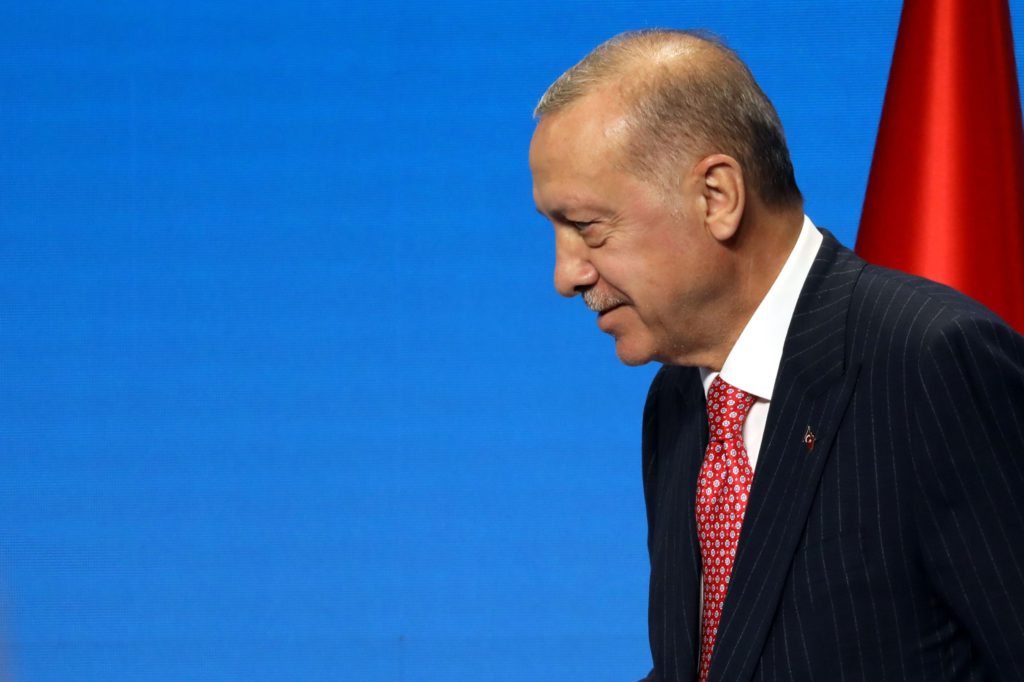(Bloomberg) — Turkey’s lira continued its rally at a strong pace, adding to Monday’s 23% surge that followed the announcement of extraordinary measures from the government to bolster the currency.
The lira soared as much as 20% against the U.S. dollar, extending the currency’s gains since Friday to more than 40%. The whipsaw trading saw the currency swing from a record low of 18.3633 early on Monday to as strong as 11.0990 in Istanbul on Tuesday morning. The two-day rally is the biggest since 1983, according to data compiled by Bloomberg.
The currency rocketed Monday after President Recep Tayyip Erdogan’s government said it planned a number of measures including the introduction of a program to protect savings from the lira’s fluctuations. The government will make up for losses incurred by holders of lira deposits should its declines against hard currencies exceed interest rates promised by banks, Erdogan said.
“It may signal that the worst is over for the lira for now, if the program can restore some of the confidence of retail lira depositors,” said Todd Schubert, head of fixed-income research at Bank of Singapore Ltd. “However, at the end of the day, until interest rates provide a credible anchor against inflation, the lira will tend to be volatile and subject to downward pressure.”
The lira was 10% stronger at 12.0685 per dollar as of 9:49 a.m. in Istanbul.
Gyrations in the Turkish lira have sent the dollar-lira pair’s one-month volatility, a gauge of expected swings, to 61%, the highest level since 2018.
The government’s new measures are intended to mitigate retail investors’ demand for dollars and bring an end to three months of turmoil for the nation’s currency. But just how local investors react — and whether the new policies are sustainable — remains to be seen.
Turkey’s five-year credit default swaps remain at around 624 basis points, close to the highest since April last year, signaling investors still harbor concerns over the nation’s debt-repayment capability.
Erdogan’s announcements “could help the currency, but I think it comes down to credibility and whether depositors believe that’s a policy that can actually be implemented,” said Brendan McKenna, a currency strategist at Wells Fargo in New York. “Right now, Turkish institutions don’t have a ton of credibility, so there may be challenges getting lira depositors on board.”
Turkey’s currency has been battered for years as Erdogan has assumed a tighter hold over the economy and turnover at the top of the central bank has intensified. The Turkish leader is heading toward general elections in 2023, the first since his shock defeat in the 2019 municipal vote, which saw Istanbul and Ankara lost to the opposition for the first time in a quarter of a century.
New Governor
Current central bank Governor Sahap Kavcioglu took office in March following Erdogan’s dismissal of Naci Agbal after just four months in the job. Agbal was a proponent of rate increases to tackle inflation, while Erdogan, bucking economic convention, argued that lower borrowing rates help tame consumer-price gains. Kavcioglu is Turkey’s fourth central bank chief in less than three years.
Going forward, investors will be focused on how much of the positive response by global foreign-exchange markets is maintained when traders in the region have the opportunity to really weigh in. It also came in a holiday-affected week and ahead of year-end, factors that have historically affected market liquidity.
Prior to the recent rebound, the lira had lost about half of its value against the U.S. dollar since September, with declines gaining pace after Erdogan last month unveiled an economic model that relies on lower borrowing costs and a cheaper currency. Erdogan has said Islam demands lower rates.
The central bank has slashed the one-week repo rate by five percentage points since September, in line with Erdogan’s demands. The monetary authority has also intervened in the foreign-exchange market four times this month to stop the currency depreciation.











